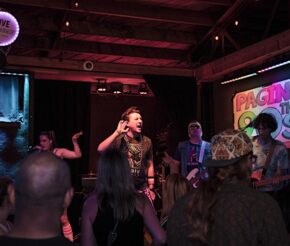- Advertise
-
Subscribe
The Changing Tides in The Music Industry

Kurt Cobain, Amy Winehouse, Jimi Hendrix, Janis Joplin – all of them are musical legends. But all of them were gone before their 30th birthday. The 27 Club members – famous musicians who tragically died at the age of 27 – is a somber reminder of our societal fascination with living life on the edge.
It’s what we expect from our musical icons. If they sing about sex, drugs, and rock and roll, it’s taken as a given that they should practice what they preach.
It’s not just rock and roll – plenty of other genres glorify hedonism
It’s a phenomenon that isn’t limited to a single musical genre.

While rockstars are widely associated with their hedonistic habits, they’re not the only group of musicians who make it big by marketing the lifestyle fans dream about having but don’t truly want.
Rappers glorify extreme wealth and even more radical ways of getting it – think gang violence, shootings, running a drug ring, the lot.
As Lil Kim says in her The Jump Off R&B hit, “‘you know what we about, sex, drugs and cash.”
Country and Western singers – a group famous for their somber songs about being driven to drink – are no strangers to the bottle either.
Many have struggled with alcoholism – some fatally, like Keith Whitley.
Megastars with public deterioration garner heaps of media attention
The emotional highs and lows of having a precarious schedule are enough to drive anyone to extremes.
Throw the partying hard culture and putting on a show that’s par for the course into the mix and it’s easy to see how a music career and an early grave can go hand in hand.
But we’re not here to discuss the trials and tribulations of life in the music industry. We’re more interested in why everyone’s so fascinated with it – yes, ourselves included.

Music megastars with very public deterioration garner heaps of media attention – and record sales with it. Ozzy Osbourne got famous not in spite but in light of his crazy, drug-fuelled antics:
“Booze, coke, heroin, acid and Quaaludes to glue, cough syrup, Rohypnol, klonopin, Vicodin […] on more than a few occasions, I was on all of those at the same time”
Ozzy Osbourne
We want to know about experiences that push people to their outermost limits. We don’t want to experience them ourselves, though, hence the obsession with living vicariously through the wild lifestyles of our fave celebs.
But we’re also interested in the opposite side of the coin
Gen Z is much more inclined to chase a healthy lifestyle, best characterized by drinking water, getting a full 8-hour sleep, and healthy coping mechanisms. Much more than our parents were anyway with their beloved Club 27 members anyway.

Yes, you guessed that right. The lyrics we hear, the songs we listen to and the music heroes we worship all have a major impact on how we navigate life.
Whilst it might have dented a rocker’s career to get clean – AKA ‘boring’ – in the past decades, nowadays there’s an ever-growing fascination with wellness culture, especially when considering musician’s wellbeing.
So much so that toxic positivity became a thing.
Open conversations about mental health are constantly spawning on TV screens and radio waves.
Knowing when to get help and how to access it is a key message put forth by creators from all parts of the globe – among them, there are our musical idols.
Full-time music heroes, part-time mental health advocates
Global superstars Logic, Khalid, and Alessia Cara dedicated an entire song to directe fans to the US National Suicide Prevention Lifeline (given in the title of the track – 1-800-273-8255).
After the song’s music video took the digital world by storm, calls to the organization went up by as much as 50%.
Gone seem the days of hopeless lyrics like ‘Maybe then I’ll fade away and not have to face the facts’ (courtesy of the Rolling Stones). In their place came a more uplifting message, put forth in Logic’s chorus, which progresses from “I don’t wanna be alive” to “I want you to be alive,” ending in the triumphant, “I finally wanna be alive”.
As listeners, we want to strike a balance between hedonism and health consciousness
Societal taboos surrounding mental health, suicide, and self-destructive behaviours lessen, but expectations increase. Those impatient expectations translate into the anticipation of witnessing those in the public eye do their bit to promote healthier coping mechanisms than sex, drugs, and alcohol.

We love to hear Club 27 members’ stories of smashed-up hotel rooms and week-long benders.
But as a young generation of listeners, we seem to hunt for the balance between hedonism and health consciousness.
Just look at how the punk movement has changed since its Gen Z revival.
We can kiss toxic whining about teenage angst and high-school girls who don’t like you back goodbye.
Those leitmotifs have been replaced by the learnings of Willow Smith, Pinkshift, and Olivia Rodrigo – singers who combine burn-the-house-down craziness with tales of finding their ex a therapist, or telling their therapist about their ex.
So, have we moved past the days of glamorizing breakdowns and fetishising the live fast die young mantra that monopolized the lives of Club 27 members?
Not quite – and we probably never will. There’s something in our human drive that has a soft spot for drama and debauchery. Whether we like it or not, humans gravitate toward tragedy. It’s in our psychological makeup.
Nothing’s changed, but nothing is the same as it was
But that doesn’t mean nothing’s changed. If a few decades ago music devotees embraced Club 27 members with both their lows and highs, now we expect more than crazy caricatures of a life we wouldn’t want to live for more than one day.

We expect honesty, rawness, and openness.
We expect role models for ourselves and our children.
In truth, maybe we expect too much from the people we put on the highest pedestal but expect to remain grounded.
That’s just the way it’s always been. Whether it’s self-destruction or self-improvement, we have – and probably always will – looked up to our beloved musicians.
At the end of the day, song and lyric, our music idols’ lifestyles embody everything we want, but we’re too afraid to chase. At least they give us that – a second-hand experience of a hands-on tale between life and death.
If you or someone you know is struggling, this list of lifelines is here to help.





